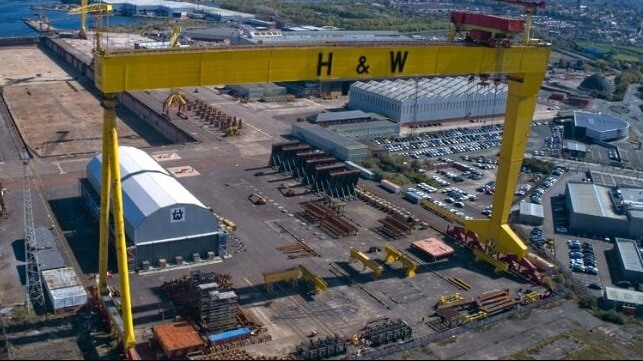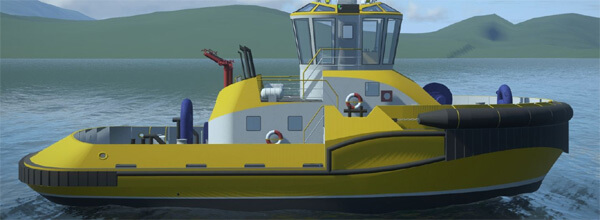Harland & Wolff to Lead Development of Zero-Emission Battery Tugs

Harland & Wolff is leading a new consortium that plans to develop and build a new generation of zero-emissions harbor and coastal tugs. The revived group, which was bought out of bankruptcy in 2019, called this project part of its continued business development strategy focusing on fabrication, construction, repair, and decommissioning in the maritime and offshore industries.
Harland & Wolff entered into an agreement with Macduff Shipyards located in Scotland which designs harbor and coastal service vessels as well as fishing boats. They will work with Kongsberg Maritime and Swedish energy storage company Echandia in the development of the tugs. The companies highlight their belief that there will be a significant and growing requirement for these types of vessels as the industry transitions to clean operations in the coming decade.
"As part of our ongoing commitment to fully embrace the UK National Shipbuilding Office's aims and in our drive to Net Zero, we are pleased to have put together this consortium,” said John Wood, Group Chief Executive Officer of Harland & Wolff. “Not only are these the first vessels of this type to be designed and constructed in the UK, but they also provide firm foundations for the build of various vessels requiring this type of technology in the future."
The project calls for the initial construction of two tugs that would be nearly 84 feet long with a breadth of 39 feet and a draft of approximately 16 feet. They would have a strong bollard pull capacity of 50 tonnes for vessels their size. The tugs are expected to have Azimuth stern drives and a series of modular battery banks. They are also planning to build two barges, one 295 feet in length and the other 164 feet in length, that are initially intended to move loads between Harland & Wolff’s yards, but when the barges are not full, they could transport freight for other clients.

The tug will use battery-power with a back-up generator (Harland & Wolff)
Harland & Wolff will lead the project and be the builder, while Macduff Ship Design will develop the designs. Kongsberg will contribute the propulsion for the tug and vessel control systems while Echandia will develop the battery and electrical control systems.
They plan to develop a design that combines proven battery and propulsion technologies to deliver a zero-emissions vessel that will utilize electric propulsion from stored battery power for day-to-day operations. The operations would be backed up by generators driven by biofuel for exceptional operations or when shore charging support is unavailable.
The companies note that the tug designs would be a first step to the broader requirements from other sectors to also transition to zero-emission operations. The technologies deployed in the tug project they note will be scalable to enter into the CTV and SOV markets.
The company’s historic Belfast yard is one of Europe's largest heavy engineering facilities and was acquired in October 2019 after having lapsed into bankruptcy. The new group acquired Appledore in August 2020 as an additional construction and repair site and two Scottish-based yards in 2021 which they are using for fabrication work focusing on the renewables, energy, and defense sectors. This week the company’s yard in Arnish, Scotland is delivering its largest project to date, frames for a Canadian mining company that is constructing a barge mooring system for a site in Greenland. The Belfast yard beginning in April began delivering barges, its first newly build vessels in 20 years. Harland & Wolff is also part of a consortium with Navantia UK that won a government contract that includes building three naval support ships.
No comments:
Post a Comment